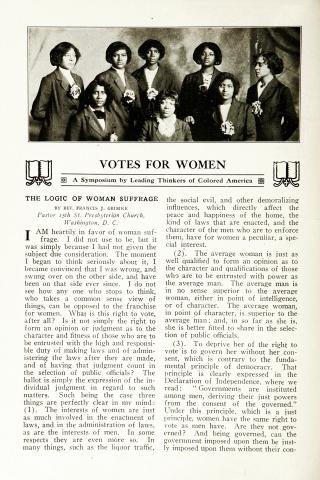
For this week we were asked to find a piece on the MJP's website about suffrage during WWI. In searching, I found a really interesting section in The Crisis from August 1915. The Crisis was a magazine published monthly created by the NAACP, and was "conducted" by W.E.B. DuBois. I chose August 1915 because there is a section entitled "Votes for Women: A Symposium by Leading Thinkers of Colored America." Within this section there are many smaller articles about women's suffrage. One in particular, "The Logic of Woman Suffrage" by Rev. Francis J. Grimke caught my eye because of a few things. The first was that the author was male and a reverend. This surprised me that a male reverend would be for women's suffrage because I would have thought that opposite was true. While he states that he used to not be for it, he is now because, he says, "The moment I began thinking about it, I became convinved that I was wrong, and swung to the other side, and have been on that side ever since" (178). In his actual argument, he lays out three reasons he believes women's suffrage must happen: women's interests are just as important to the enactment of laws as men, the average woman is as qualified as a man to think form an opinion, and that because women are governed, it is unlawful for them to not have a vote because then they are being governed without a say. He also states that voting is merely the act of showing the government your opinion, but you have formed an opinion regardless of whether you can vote or not. I found all of these arguments compelling, especially given that the points are so well thought out and, as his title suggests, logical. I would be interested to see if there were mailed in responses to this section, "Votes for Women," later on in the same way we saw the responses in The Freewoman vol. 1 no. 19 that we read for this week.

Comments
Justin Stanley
Thu, 02/22/2018 - 07:52
Permalink
Aubrey,
Aubrey,
Great post! It also seems to me like a Reverend would end up on the anti-Suffrage side of the aisle. I think the quote that you pulled acts as an example of the line between those for suffrage, and those against. Grimke states that "[t]he momen I began thinking about" was the moment he changed his mind. Thought, then, becomes the dividing line. Perhaps this deduction is a bit too crass, although after reading the review of Harold Owen's "Woman Adrift" in the The Freewoman, it doesn't really seem to be innaccurate. Owen's assertion that adultery, when committed by a woman, has a much greater affect on their "moral nature," than a man would notice if he completed the same action (369). This suggests that a woman's moral nature is more pristine at the outset, if perhaps more fragile. It seems to me that a higher moral standard would be welcomed in voters, if not in every member of society. It is clear to me that any amount of stupidity can be argued with success so long as the audience is in agreement with the basic premises (women shouldn't be allowed to vote, fake news, etc.), as we should all know in the current period of American History.